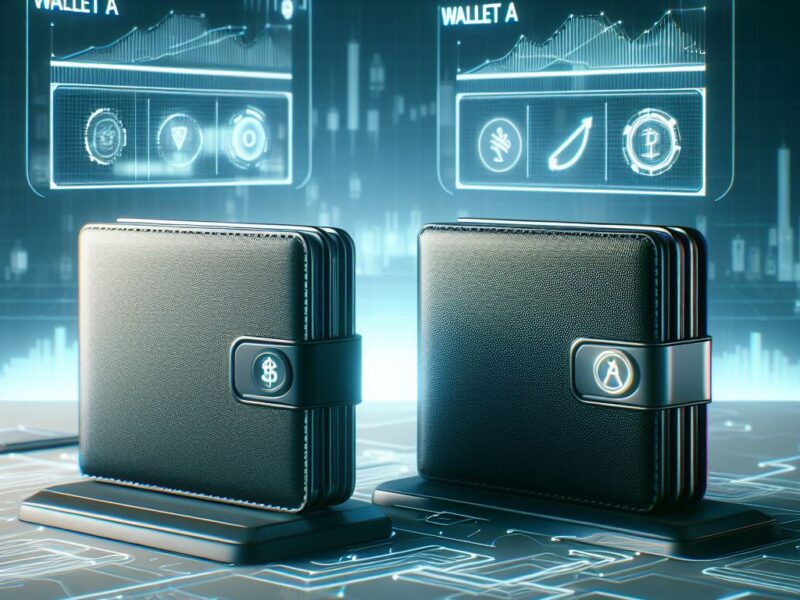You are just starting cryptocurrency, and now faced with a crucial decision which is choosing a wallet to store and secure your digital assets. In this post, we have comprehensively covered the types of crypto wallets, their features, and the pros and cons of each, so as to help you make the right choice.
1. Hot Wallets
Hot wallets are the most common type of crypto wallet, and for good reason – they’re easy to use, accessible, and often free. These wallets are connected to the internet, making them convenient for frequent trading and transactions. Examples of hot wallets include web wallets, mobile wallets, and desktop wallets.
Web wallets, such as those provided by exchanges like Coinbase or Binance, allow you to access your funds through a web browser. They’re incredibly user-friendly, but it’s essential to remember that your private keys are stored on the exchange’s servers, which can be vulnerable to hacks or security breaches.
Mobile wallets, like Trust Wallet or Mycelium, are apps that you can download on your smartphone. They offer the convenience of managing your cryptocurrencies on the go, with the added security of storing your private keys on your device. However, if your phone is lost, stolen, or compromised, your funds could be at risk.
Desktop wallets, such as Exodus or Electrum, are software programs that you install on your computer. They provide a balance between security and convenience, as your private keys are stored on your hard drive. However, if your computer is hacked or infected with malware, your funds could be vulnerable.
2. Cold Wallets
Cold wallets are also known as offline or hardware wallets. They are the most secure option for storing your cryptocurrencies. These wallets are not connected to the internet, which makes them virtually immune to hacking attempts and online threats. There are two main types of cold wallets: hardware wallets and paper wallets.
Hardware wallets, like the Ledger Nano X or Trezor Model T, are physical devices that store your private keys offline. They typically connect to your computer via USB, allowing you to manage your funds and sign transactions securely. Hardware wallets are an excellent choice for long-term storage or holding large amounts of cryptocurrency.
Paper wallets are simply private keys printed on a piece of paper. They offer the highest level of security, as they’re completely offline and not susceptible to digital threats. However, paper wallets can be easily lost, damaged, or stolen, so it’s crucial to store them securely and create multiple copies.
3. Custodial Wallets
Custodial wallets are crypto wallets where a third party, such as an exchange or online wallet provider, holds and manages your private keys on your behalf. This type of wallet is often used by beginners or those who prefer the convenience of not having to manage their own private keys.
Read also: Best Cryptocurrency Staking Platforms In 2024
The main advantage of custodial wallets is their ease of use – you can access your funds quickly and easily through the provider’s platform. However, this convenience comes at the cost of reduced security, as you’re trusting the provider to keep your funds safe. If the platform is hacked, goes bankrupt, or is subject to government seizure, your funds could be at risk.
4. Non-Custodial Wallets
Non-custodial wallets, also known as self-custody wallets, are crypto wallets where you retain full control over your private keys. This means that you, and only you, have access to your funds, and no third party can freeze, seize, or manipulate your assets.
Examples of non-custodial wallets include many hardware wallets, desktop wallets, and mobile wallets that allow you to store your private keys locally. These wallets often provide a recovery phrase or seed phrase, which is a set of words that can be used to restore your wallet and access your funds in case your device is lost or damaged.
Non-custodial wallets offer a high level of security and financial sovereignty, but they also come with greater responsibility. If you lose your private keys or recovery phrase, there’s no customer support to help you regain access to your funds. Therefore, it’s crucial to store your recovery phrase securely and never share it with anyone.
5. Multi-Signature Wallets
Multi-signature (multisig) wallets are a type of wallet that requires multiple signatures or approvals before a transaction can be executed. This adds an extra layer of security and can be useful for organizations, businesses, or individuals who want to prevent unauthorized access to their funds.
In a multisig setup, multiple private keys are associated with a single wallet address. For example, in a 2-of-3 multisig wallet, there are three private keys, and at least two of them must be used to sign a transaction before it can be broadcast to the network. This ensures that no single party can unilaterally move funds without the consent of the other key holders.
Multisig wallets can be set up using various platforms and tools, such as Electrum, Gnosis Safe, or BitGo. They’re particularly useful for escrow services, group investments, or situations where multiple parties need to approve transactions.
Choosing the Right Crypto Wallet
When selecting a crypto wallet, it’s essential to consider your specific needs, preferences, and the level of security you require. Here are some factors to keep in mind:
- Security: If you’re holding large amounts of cryptocurrency or planning to store your assets long-term, a cold wallet like a hardware wallet may be the most secure option. For smaller amounts or frequent trading, a reputable hot wallet with strong security features can be sufficient.
- Ease of use: If you’re new to cryptocurrency, a user-friendly hot wallet or custodial wallet may be more suitable. As you gain experience and accumulate more assets, you can consider moving to a more secure, non-custodial option.
- Supported cryptocurrencies: Make sure the wallet you choose supports the cryptocurrencies you want to store. Some wallets are designed for specific coins, while others offer multi-currency support.
- Backup and recovery: Always ensure that you have a secure backup of your private keys or recovery phrase. Look for wallets that offer easy-to-use backup features and clear instructions for recovering your funds in case of loss or damage.
- Reputation and community support: Choose wallets from reputable companies with a strong track record in the industry. An active community and responsive customer support can be invaluable if you encounter any issues or have questions.
Frequently Asked Questions
1. Can I have multiple crypto wallets?
Yes, you can have multiple crypto wallets, and it’s often recommended to diversify your holdings across different wallets for added security. You might use a cold wallet for long-term storage, a hot wallet for frequent trading, and a mobile wallet for day-to-day transactions. Just remember to keep track of your private keys and recovery phrases for each wallet.
2. Are crypto wallets tied to specific cryptocurrencies?
Some wallets are designed specifically for certain cryptocurrencies, such as the Bitcoin Core wallet for Bitcoin or the MyEtherWallet for Ethereum and ERC-20 tokens. However, many wallets, particularly hardware wallets and multi-currency wallets, support a wide range of cryptocurrencies. Always check the wallet’s specifications to ensure it supports the coins you want to store.
3. How do I transfer funds between different crypto wallets?
To transfer funds between wallets, you’ll need the recipient wallet’s public address. Each wallet has a unique public address, usually a long string of letters and numbers. In your sending wallet, look for a “Send” or “Withdraw” option, enter the recipient’s address, specify the amount you want to send, and confirm the transaction. Always double-check the address before sending, as cryptocurrency transactions are irreversible.
4. How do I back up my crypto wallet?
The process for backing up your wallet depends on the type of wallet you’re using. For most non-custodial wallets, you’ll be provided with a recovery phrase or seed phrase when you first set up the wallet. This is typically a list of 12 to 24 words that can be used to restore your wallet if it’s lost, stolen, or damaged. Write down this phrase, store it securely offline, and never share it with anyone. Some wallets also allow you to create additional backups, such as encrypted files or QR codes.
5. What happens if I lose my phone or computer with my crypto wallet on it?
If you lose a device with a hot wallet installed, your funds may be at risk if someone else gains access to the device. That’s why it’s crucial to enable strong security measures like PIN codes, biometric authentication, and two-factor authentication when available. If you have a backup of your private keys or recovery phrase, you can restore your wallet on a new device. For cold wallets, your funds are safe even if you lose the physical device, as long as you have your recovery phrase.
6. Can I use the same crypto wallet for multiple cryptocurrencies?
Many wallets, particularly multi-currency wallets, support storing and managing multiple cryptocurrencies within the same wallet interface. For example, the Ledger Nano X and Trezor Model T hardware wallets support over 1,000 different coins and tokens. However, it’s important to note that each cryptocurrency will have its own unique public address within the wallet, and you should only send the specific coin to its corresponding address.
7. Are crypto wallets legal?
Crypto wallets themselves are legal in most countries, as they’re simply tools for storing and managing digital assets. However, the legality of cryptocurrencies and their use varies by jurisdiction. Some countries have embraced cryptocurrencies, while others have imposed restrictions or outright bans. Always research and comply with the laws and regulations in your country regarding cryptocurrency ownership and use.










